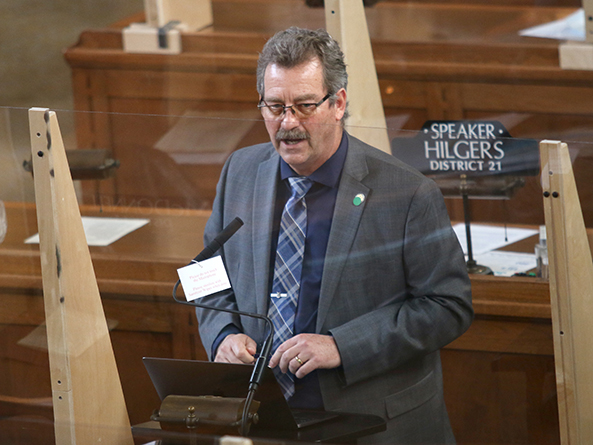Session Review: Natural Resources
Proposals to ban the use of treated seed in ethanol production and create a legal framework for carbon dioxide sequestration were among the measures advanced by the Natural Resources Committee this session.
LB507, introduced by Brainard Sen. Bruce Bostelman, prohibits the use of treated seed in the production of ethanol if its use results in the generation of a byproduct that is deemed unsafe for livestock consumption or land application.
The bill also contains provisions of LB190, introduced by Venango Sen. Dan Hughes, which prohibit the Legislature from appropriating or transferring money from the Water Sustainability Fund for purposes other than those outlined in statute after June 30, 2021.
The provisions of LB191, also introduced by Hughes, allow a qualified landowner or leaseholder to be an irrigation district elector if they live in a certain irrigation district in which at least half of the landowners, leaseholders or entrymen of government lands are not Nebraska residents.
Under provisions originally introduced by Creighton Sen. Tim Gragert as LB395, the secretary of the state Game and Parks Commission may designate special antelope and elk depredation seasons or extend existing hunting seasons when they determine that the animals are causing excessive property damage.
A Nebraska resident will pay no more than $25 for a special depredation season permit, and a nonresident will pay no more than $75.
The bill requires the commission to charge landowners and their immediate family members no more than $10 for a special depredation season permit. Those who own or operate at least 20 acres of farm or ranch land within the geographic area in which hunting is permitted may take deer and antelope, and those who own or operate at least 80 acres may take elk.
Finally, LB507 requires the commission to issue one free-earned elk permit to certain landowners and lessees when hunters have harvested the qualifying number of antlerless elk on their land.
The commission will use income from the special permits to abate damage caused by deer, antelope and elk.
The bill passed 48-0 and takes effect immediately.
Lawmakers also approved a measure that increases state park entry fees for nonresidents.
LB336, introduced by Hughes and passed on a vote of 49-0, sets the annual permit fee for a nonresident motor vehicle at twice the fee for a resident motor vehicle or $60, whichever is greater.
It sets the fee for a temporary permit for a nonresident motor vehicle at twice the fee for a resident motor vehicle or $12, whichever is greater.
Another measure, passed on a vote of 46-1, creates a special legislative committee that will study potential flood control projects and related economic development opportunities in three areas of the state.
LB406, sponsored by Omaha Sen. Mike McDonnell, creates a special committee, consisting of at least seven members of the Legislature, that will study the need to protect public and private property, enhance economic development and promote private investment along the Platte River and its tributaries from Columbus to Plattsmouth.
The committee will conduct similar studies on the Lake McConaughy region and the region in Knox County that includes Lewis and Clark Lake and Niobrara State Park.
The Platte River study cannot include a study of any dam on the river’s channel but may include infrastructure that maintains the integrity of its main channel.
With the Executive Board’s approval — and after a competitive bidding process — the committee may enter into contracts for consulting, engineering and development studies. The committee will complete each study no later than Dec. 31, 2022, and will terminate on that date.
Senators also approved a measure that creates a legal and regulatory framework for the geologic storage of carbon dioxide in Nebraska.
Under LB650, introduced by Sen. Michael Flood of Norfolk and passed on a vote of 48-1, the Nebraska Oil and Gas Conservation Commission will regulate facilities that inject carbon dioxide through wells into underground geologic formations for permanent or short-term storage.
The bill allows geologic storage only if a storage operator obtains a permit from both the commission and the Environmental Protection Agency’s Underground Injection Control program. Before the commission issues a permit, it must hold a public hearing and consult with the state Department of Environment and Energy and the federal permitting authority.
The commission must find that the proposed storage facility would not endanger surface waters or underground drinking water sources and that the storage operator will establish a testing and monitoring plan to assess the location and migration of injected carbon dioxide.
LB650 requires storage operators to pay the commission two fees on each ton of carbon dioxide injected for storage, one to defray administrative expenses and another to defray expenses incurred in the long-term monitoring and management of a closed storage facility.


